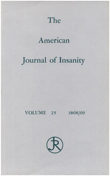Proton magnetic resonance spectroscopy investigation of hyperventilation in subjects with panic disorder and comparison subjects
Abstract
OBJECTIVE: The purpose of this study was to investigate differential effects of hyperventilation on brain lactate in patients with panic disorder and comparison subjects as a possible mechanism for explaining previous observations of an excess rise in brain lactate among panic disorder subjects during lactate infusion. METHOD: Seven treatment- responsive patients with panic disorder and seven healthy comparison subjects were studied with proton magnetic resonance spectroscopy to measure brain lactate during controlled, voluntary hyperventilation over a period of 20 minutes. Hyperventilation was regulated with the use of capnometry to maintain end-tidal PCO2 at approximately 20 mm Hg during the period of hyperventilation. Blood lactate was measured prior to and at the end of hyperventilation. RESULTS: At baseline the two groups had similar brain lactate levels. Panic disorder subjects exhibited significantly greater rises in brain lactate than comparison subjects in response to the same level of hyperventilation. Blood lactate levels before and after 20 minutes of hyperventilation were not significantly different between groups. CONCLUSIONS: Controlled hyperventilation increases brain lactate and does so disproportionately in subjects with panic disorder. This increase in brain lactate may result from decreased cerebral blood flow due to hypocapnia, and individuals with panic disorder may have greater sensitivity to this regulatory mechanism.
Access content
To read the fulltext, please use one of the options below to sign in or purchase access.- Personal login
- Institutional Login
- Sign in via OpenAthens
- Register for access
-
Please login/register if you wish to pair your device and check access availability.
Not a subscriber?
PsychiatryOnline subscription options offer access to the DSM-5 library, books, journals, CME, and patient resources. This all-in-one virtual library provides psychiatrists and mental health professionals with key resources for diagnosis, treatment, research, and professional development.
Need more help? PsychiatryOnline Customer Service may be reached by emailing [email protected] or by calling 800-368-5777 (in the U.S.) or 703-907-7322 (outside the U.S.).



